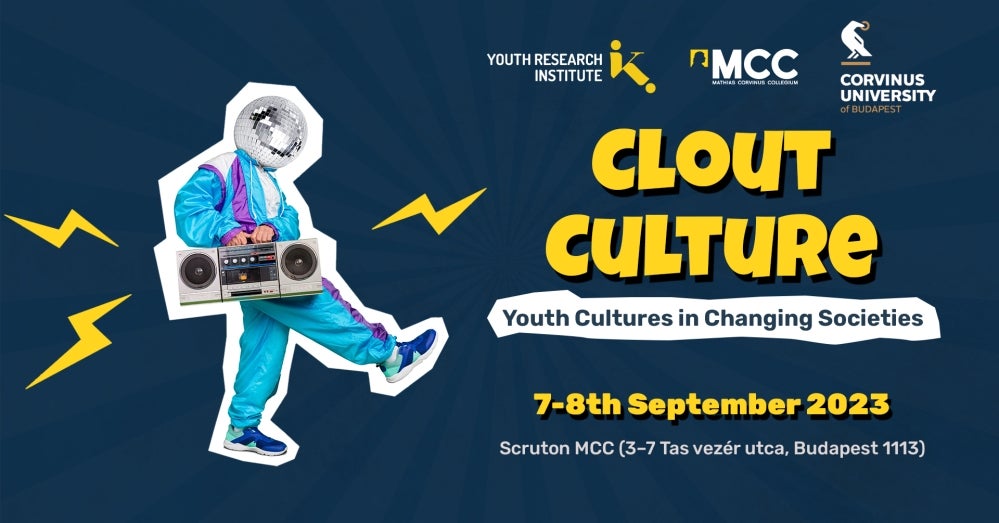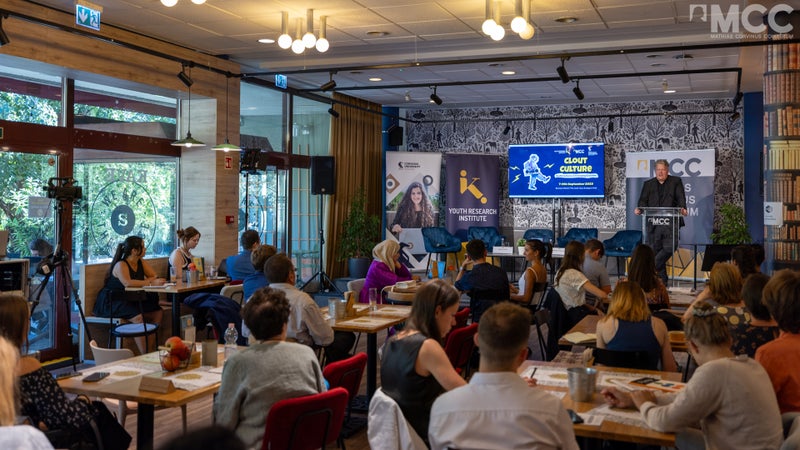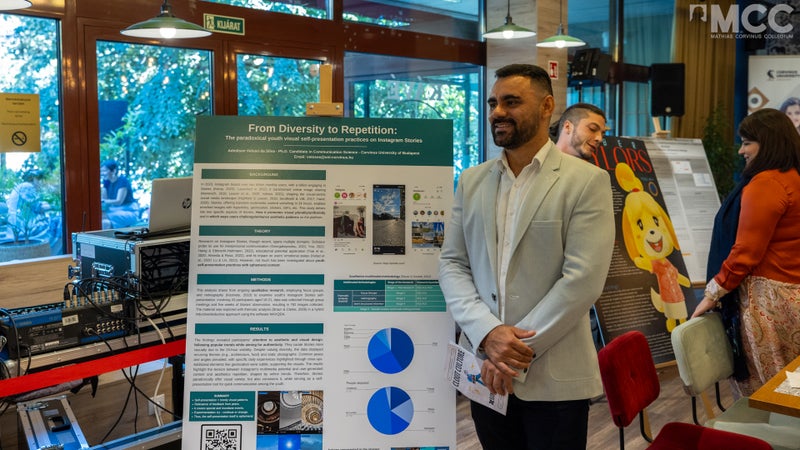From office feeling to cosplay: what’s on young people’s minds?

Does spending too much time in front of a screen ruin children’s memory and attention? How to get adolescents and young adults interested in cultural values? What impact did Covid have on young people, how far were they able to overcome the problems caused by the epidemic? These are the questions that the participants of Clout Culture: Youth cultures in changing societies attempted to answer.
“It is important to know what the motivations of youth are, what young people want to become, because in the past decades we have learned that youth is the most important part of society” – these were the words of Tamás Gyulavári, Head of the Institute of Marketing and Communication Sciences at Corvinus University of Budapest, who welcomed the participants. Then Gergely Böszörményi-Nagy, head of Design Terminal and founder of Brain Bar, spoke about the different effects of e-books and printed books – in other words, real books – on the reader. Research also confirms that printed books have a better effect on the reader, especially on memory and long-term knowledge, he stressed. He believes that digitalisation is causing serious mental problems for children and young people, and he would ban digitalisation from schools, saying that Microsoft and other companies are “eating up” schools and as a result children cannot pay attention for more than 19 seconds.

photo source: facebook.com
Teenagers are the hardest to engage with programmes.
The panel discussion, titled “Current Issues in Cultural Research”, focused on how to involve young people in various music, arts and culture programmes. (It is worth noting that in many studies, people are considered young up to the age of 39, in the spirit of “prolonged youth”.)
“The power of words is enormous”, said Dr. Réka Benczes, Professor of Communication and Media Studies at Corvinus. He said that typing the term “youth culture” into her computer brought up 5 million results, but he saw little new research in this area. She added that an important issue for her is how to retain the attention of university students. “My young colleagues are brilliant in this genre, they use more visualisation and we make university teaching as interactive as possible,” he said. Benczes’ research focuses on the impact of language on our lives and society, as words can also entrench prejudices. He used the words bachelor and spinster as examples – the word bachelor is associated with wisdom, while spinster has a pejorative connotation: you’re probably not good-looking if you’re a spinster. “Language carries stereotypes and these stereotypes get entrenched,” he stressed.
In a special interview given to the university newspaper during the break of the conference, the professor said that Corvinus, including the communication faculty, has very motivated students, but of course their attention must be maintained and their talent must be nurtured. As he said, he often talks to students who freely express their opinions, and his research has been supported by the suggestions of young people. She is currently researching an exciting topic with Australians: how people talk, or mostly don’t talk, about depression in old age, and what language people use in Australian English to talk about it. (If you are interested in this very topical issue, you should come to Corvinus on 29 September, as Dr. Réka Benczes will speak on this topic at the Corvinus Researchers’ Night.)
Surveys show that half of 15-29 year olds never go to the opera or to a classical music concert, preferring to listen to music at home, with friends or while travelling. On this topic, Zsuzsanna Szálka, Deputy Director of Coordination of the House of Music Hungary, said that classical music is more of a senior club, and they fight for tickets to quality concerts. Engaging young people through different means is an important goal – the panellists agreed. Alexandra Solea, associate professor at the National University of Music in Bucharest, believes that it is worth using different educational programmes to support the cause; not only children, but also families should be encouraged to attend such programmes. He added: “It’s typical thinking that ‘I’ve never been to the Opera, why should I go?'” The Deputy Director of the House of Music said that a lot of concerts are streamed, making it easier for people in rural areas to access music. Digital tours and interactive programmes are being introduced, mainly to attract new audiences. They use mime, theatre and even science in their programmes to increase the number of students and visitors.
When asked which age group is the most difficult to reach, experts agreed that it is teenagers. As they added, this is not just a problem for parents.
This age group can see six months ahead at most
This was followed by the “World Café Discussion” part of the conference. PhD students printed out their own research on youth and their main findings on a whiteboard, and conference participants were free to ask questions. Patrícia Rédai Virág (Corvinus), for example, researched how to bring employers and employees closer together in sub-generations within Generation Z. After interviewing 156 young people and conducting 6 focus group discussions, the researchers found the answer to why this generation often changes jobs and HR people complain that they don’t know how to bring the company closer to young people. “I’ve noticed that I have to split the generation into 2 different teams here and Covid has something to do with it. The 18-21 year olds have simply missed out on the office feeling because of the epidemic and working from home all the time. They manage their own time, there are no rivalries at work, but no conversations in the café either, while the 21-25 age group is familiar with these. 18-21 year olds believe that being present in the workplace makes it easier to build a career and make friends with colleagues. “One of the lessons I’ve learned is that although the most common question in a job interview is what you see your life looking like in 10-15 years, in today’s world, this age group can only see six months ahead at most, because there are so many uncertainties, and again Covid has something to do with that,” he said of his research. He added that this is why he considers 2-year trainee programmes to be very good, because there is a tangible programme, and the young person can foresee his or her future for at least that long.
Admilson Veloso (Corvinus) looked at young people’s posts on Instagram, how users present themselves, in what context. The most common photos are of people on a trip, or simply posing for the camera, taking a walk, or at a festival. Katalin Julianna Dinnyés (University of Pécs) used 380 questionnaires and fifty questions to investigate what values young people consider important among health, family, security, happiness and love of life. The survey found that married people are on more stable emotional ground than those not in a long-term relationship.
The second day of the conference featured presentations. Anna Brosch, assistant professor at the University of Silezia in Katowice, talked about the power of social media and celebrities who do everything to be famous, create real scandals or torture animals and film it. Many young people can no longer exist without social media.

photo source: facebook.com
From street performers to cosplayers
Dr. Andrea Kárpáti, professor of the Department of Communication and Media Sciences at Corvinus, gave a presentation on the visual language of youth, on two youth subculture studies, which revealed that alongside digital culture, many traditional media communicate with millions of young people worldwide. Visual Culture Learning Communities (VCLCs) were studied in Amsterdam, Budapest, Chicago, Helsinki, Hong Kong, Istanbul and Montreal in 2020. Street artists who create a range of exciting visual symbols from graffiti to street installations, or demosceners, who create multimedia works using the latest digital techniques, spend hundreds of hours learning their chosen visual language, which gives them the opportunity to express themselves and experience success, while shaping their identity and enriching their knowledge in many areas of contemporary and historical culture. There are about 40,000 amateur manga and anime comic artists in Hungary, and they also learn about Far Eastern culture on their social platforms and gatherings. Role-players(cosplayers) who portray characters from a film or novel study the period in which the work is set, source the materials and create the period costumes themselves. It takes a lot of learning, work and creativity. Fan-artists choose a work of art: a film, a novel or a work of visual art, and further develop the original work in a drawing, photograph, film or text. It is also a subculture that requires a lot of learning, since the basis of creating your own work is a careful study of the original artwork.
“Based on international research done in 2010, forty students in small groups in the Creative Visuality 2020 subject have followed in the footsteps of the imaging communities that were popular in 2010. The most popular ones were found and documented through participant observation. Their photos showed the diversity and creativity of the visual language of contemporary young people beyond social media and in real as well” – said Dr. Andrea Kárpáti.
Young people struggled to make the most of life during Covid
Péter Pillók, Associate Professor at Pázmány Péter Catholic University, spoke about the values that matter to young people. Because this age group lives in the digital space to a certain extent, it has become very important for them to like and watch, which means a new kind of capital culture. Hedonism, the thrill of life, is gaining ground among young people. He also talked about resilience, which means resistance and flexibility, how quickly teenagers and twenty-somethings can find their equilibrium, their resting point, their new normalcy after a major change. An interesting example is Covid: research shows that the epidemic was more of a problem for young people, who simply couldn’t cope. “Older people have more experience of survival, as a grandmother may have lived through several regime changes,” he stressed. Young people suffered mainly from loneliness during Covid, they could not meet their friends, so resilience worked much better for the older age group during and after the epidemic, even though they were also afraid of losing their jobs and facing financial difficulties.
Dr. Zoltán Veczán, a research fellow at Matthias Corvinus Collegium (MCC), explored generational contrasts in memes. There is an online group with 30,000 members called OK, Boomer!, which explores the generational divide and stereotypes. The group members pretend to be over 60 and act out and parody various situations. After analysing 200 posts, the rapporteur said that young people think that older people have low digital competence and are generally politically biased; in other words, the relationship between older people and young people is complicated and frustrated, although not at all hateful. Interestingly, the most neuralgic point in this relationship is public transport.
Then the festivals were discussed. According to Levente Székely, Director of the Youth Research Institute and Assistant Professor at the Corvinus Institute of Marketing and Communication Studies, the festival is actually a cult celebration, it takes visitors out of their everyday lives and of course it has economic and tourism implications. According to Júlia Szabó, a lecturer at Babeș-Bolyai University in Cluj-Napoca, festivals are worth researching because so many young people, increasingly early in life, are taking part in them. The panel, titled “Festivals through the eyes of the organisers”, explored what makes each festival special. According to Gergely Papp, the main organiser of the MCC Fest, their festival is mainly known for its strong professional discussions and cultural atmosphere, taking place in the historic city centre of Esztergom. The Valley of Arts has been around since 1989: according to its Director, Natália Oszkó-Jakab, it is a festival of all the arts, with 2,200 programmes to choose from over 10 days. “This event has a fantastic community experience value, there is hardly any distance between artist and spectator,” he said. He added: the festival has kept its core values and is for all ages: from zero, for as long as you can! According to Erika Kolonics, the main organiser of the Szeged Youth Days, even Szeged residents living abroad permanently come home for the four days of the festival, so they organise many programmes for families and aim to offer as much culture as possible to their guests. All festival organisers agreed that this is an industry with value, “where there is a lot of accommodation booked, there has definitely been a festival”, it was said.
The stimulus threshold is constantly rising
Participants in a panel discussion on “Trends in content consumption” agreed that more and more people are spending more time in front of the screen. According to Ádám Guld, Associate Professor at the University of Pécs, the way people spend their leisure time has completely changed, most of these sites operate on an economic basis, while consumers spend their leisure time on them. He added that screen addiction is also increasing among older people, simply because they have more free time. According to Nóra Falyuna, assistant professor at the National University of Public Service, this phenomenon is also influenced by Covid, as many people are bound to the screen by their work, and also by the feeling of loneliness, not only because of technology. Speaking about the latest trends, Guld said that some young people are tired of “over-filtered” content and the recent trend is “show your everyday self”, although his own research project shows that more people have realised that their own lives and those of their friends can be boring.
The relationship between artificial intelligence (AI) and algorithms and education was discussed: In his own research, Tamás Bokor, Assistant Lecturer at Corvinus, found that the overwhelming majority of students surveyed thought it was better to have a foreign language lesson taught by a live teacher rather than an algorithm. Falyuna drew attention to the fact that many people spread pseudoscientific things on the internet, and said that vaccine deniers have become the most virulent ones, pushing the idea that Hungary is just a company registered in New York. According to Bokor, those who attack artificial intelligence also tend to have a very pessimistic view of the world. He pointed out that content consumers’ stimulus levels are constantly rising, and it is now common for consumers to run two videos at the same time. Psychologists see the increase in content consumption as having very negative effects, especially when children start at a very young age. Some of the middle class, he said, raise their children consciously, not allowing them to spend dangerous amounts of time in front of a screen, and children who grow up this way will have a huge advantage over their peers. Unfortunately, many parents still think that if the child is in their room and quiet, there’s no harm done – they won’t fall out of the tree – but they will get used to the fast content consumption and won’t be able to pay attention to the nursery teacher. This puts education in a very difficult situation. Interestingly, the Dutch Minister of Education recently announced that from the beginning of next year, Dutch students will be banned from bringing mobile phones, tablets and smartwatches into classrooms. Bokor mentioned that language skills seep in unnoticed while consuming content, which is a good thing.
In the closing block of the conference, Rebeka Méry, folk singer and ethnographer, Barbara Somossy, host and director, and Anna Juhász, Programme Director of the Petőfi Cultural Agency and literary critic, agreed that there is no future without culture, and they believe that artificial intelligence that lacks emotion cannot create poems, songs, novels or films that truly speak to people.
Katalin Török